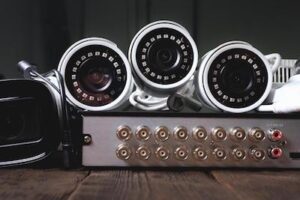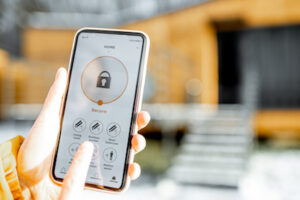Home Security Cameras: A Guide To Choosing The Best Camera For Your Home
Home security cameras have become a popular choice for homeowners looking to enhance their home security systems. With the advancement of technology, there are various types of cameras available in the market with different features that can meet different needs and budgets. Choosing the right camera for your home can be overwhelming, but it is essential to ensure that you get the best value for your money while keeping your family and property safe. So, look no further than this guide on how to choose the best security camera for your home.
This guide aims to provide an in-depth analysis of how to choose the best home security camera. It covers various factors like assessing your home security needs, types of cameras available, important features to look out for, and installation and maintenance tips. By following this guide, you will be able to make an informed decision when selecting a camera that meets all your requirements while staying within your budget.

Assessing Your Home Security Needs
The following section is focused on the assessment of individual security needs, with emphasis on factors that affect the decision-making process when selecting a surveillance system for residential properties. The first step in choosing a home security camera is assessing the specific security risks that are present in your home and neighborhood. A risk assessment will help you determine which features to prioritize when selecting a camera.
Some important considerations include:
- Whether your home is located in a high-crime area
- How many entry points are there
- Whether you have any valuables or expensive electronics that may be targeted by thieves
- The layout of your property
- Are there any blind spots or areas where intruders could hide from view
- Are there any existing security measures: locks or alarm monitoring systems
By conducting a thorough risk assessment, you can identify the most pressing security concerns and select a camera that meets those needs.
Types of Home Security Cameras
A wide variety of surveillance cameras are available on the market, each with its own unique features and capabilities that cater to different needs and situations. When choosing a home security camera, one of the first decisions to make is whether to opt for a wired or wireless option. Wired cameras require cables for power and data transmission, while wireless cameras rely on Wi-Fi connectivity to transmit data. Wired cameras tend to be more reliable as they do not depend on Wi-Fi signal strength or availability, but installation can be more complex. On the other hand, wireless options offer greater flexibility in terms of placement and ease of installation.
Another important consideration when selecting a home security camera is whether it will be used indoors or outdoors. Indoor cameras tend to be smaller and more discreet than their outdoor counterparts, making them less noticeable in living spaces such as bedrooms or living rooms. Outdoor cameras are typically larger and built with durable materials designed to withstand harsh weather conditions. Additionally, outdoor cameras often come equipped with night vision capabilities that allow them to capture clear footage even in low-light conditions. Ultimately, the choice between indoor and outdoor will depend on where you want your camera installed and what your monitoring needs are.
Features to Look for in a Home Security Camera
To ensure maximum protection for your property and loved ones, it is essential to carefully evaluate the features of potential surveillance systems before deciding on a purchase. One of the most important features to look for in a home security camera is night vision. This feature allows you to monitor your property even in low-light conditions, providing constant surveillance throughout the day and night. Look for cameras with high-quality infrared sensors that can detect movement and capture clear images in complete darkness.
Another key feature to consider when choosing a home security camera is remote access. With remote access, you can view live footage from your camera using a smartphone or other internet-connected device from anywhere at any time. This feature gives you peace of mind knowing that you can check on your property whenever you want. Whether you are at work or away on vacation. Many cameras also offer motion detection alerts that notify you if there is any unusual activity detected within range of the camera’s sensors, allowing you to take immediate action if necessary.
Installation and Maintenance Tips
This section provides insights on how to properly install and maintain a surveillance system, ensuring optimal functionality and longevity of the equipment. One factor to consider is whether to opt for DIY installation or professional security system installation. DIY installation can save money, but it can also be time-consuming and may pose some risks if not done correctly. Professional installation guarantees that the cameras are installed properly and optimally placed for maximum coverage, but it comes with a higher cost.
When installing a home security camera system, it’s important to ensure that all cables are securely connected and that the cameras are mounted on stable surfaces. Regular maintenance is also crucial in keeping the system running smoothly. Troubleshooting common issues such as connectivity problems, power failures, or image quality issues should be done immediately to avoid any potential security risks. It’s recommended to consult with the manufacturer’s instructions or seek professional assistance if necessary. Proper installation and maintenance of home security cameras will provide better peace of mind knowing that your property is protected 24/7.
Frequently Asked Questions
How can I ensure that my home security camera footage is secure and protected from hackers?
To ensure the security and protection of home security camera footage from hackers, it is imperative to implement effective cybersecurity measures. Encryption technology can be one such measure that ensures the confidentiality and integrity of camera footage by encoding it in a way that only authorized individuals with the appropriate decryption key can access it. Additionally, using strong passwords, regularly updating firmware, and restricting remote access to cameras can also help prevent unauthorized access. It is also essential to stay updated on emerging threats and vulnerabilities in order to proactively address them before they become a problem. By taking these steps, homeowners can significantly reduce the risk of their home security camera footage being compromised or accessed without authorization.
Can I access my home security camera footage remotely when I’m away from home?
Remote access to home security camera footage is becoming increasingly popular due to the convenience and flexibility it offers. With mobile app integration, users can easily access their cameras from anywhere in the world. This feature allows homeowners to monitor their property and loved ones, even while away on vacation or at work. The ability to remotely access security camera footage provides peace of mind and an added layer of protection for homes and businesses alike. However, it is essential to ensure that proper security measures are in place when accessing these cameras remotely, as they can be vulnerable to hacking if left unsecured.

How can I troubleshoot any technical issues with my home security camera system?
When it comes to home security camera systems, technical issues are bound to arise. That is why understanding some troubleshooting tips and the importance of camera maintenance can help resolve any problems that may occur. Troubleshooting tips include checking for power supply issues, ensuring proper internet connectivity, and verifying that all cables and connections are secure. In addition to these steps, regular camera maintenance should be implemented to prevent future technical difficulties. This includes cleaning the lens, updating software, and regularly checking for firmware updates. By taking these precautionary measures and troubleshooting techniques into account, homeowners can ensure their home security cameras operate efficiently and effectively at all times.
Are there any privacy concerns I should be aware of when using home security cameras?
Privacy implications and ethical considerations are critical factors to consider when using any surveillance technology, including home security cameras. The use of these devices can potentially infringe on the privacy rights of individuals, including family members or guests in the home. The placement of cameras in private spaces such as bedrooms or bathrooms could be considered an invasion of privacy, and the footage obtained may be misused by unauthorized users. It is therefore essential to adopt a responsible approach when deploying home security cameras, ensuring that their installation and usage align with legal requirements and ethical standards.
In addition, homeowners should inform all occupants about the presence of such devices and obtain their consent before installing them to avoid unnecessary conflicts or legal issues. Overall, understanding the privacy implications and ethical considerations associated with home security cameras is crucial for making informed decisions regarding their deployment while protecting individual rights and maintaining trust among household members.
Do home security cameras have any legal restrictions?
Privacy laws and surveillance regulations play an important role in determining the legality of installing home security cameras. While homeowners have a right to protect their property, they must also respect the privacy rights of others. In some jurisdictions, there are strict rules governing the use of surveillance equipment, which may require obtaining consent from neighbors or posting signs indicating that the area is being monitored. Failure to comply with these laws can result in legal consequences such as fines or even criminal charges. It is critical for homeowners to familiarize themselves with local privacy laws and surveillance regulations before investing in home security cameras to ensure they stay within legal bounds while protecting their homes and loved ones.
Conclusion
In conclusion, choosing the best home security camera can be a daunting task, but it is important to assess your specific needs in order to make an informed decision. Consider the size of your property, the level of security you require, and any potential vulnerabilities that need monitoring. There are several types of cameras available, each with its own unique features and benefits.
It is crucial to look for a camera with high-quality video resolution, night vision capabilities, motion detection alerts, and remote viewing options. Installation and maintenance are also important factors to consider to ensure that your camera is functioning properly at all times. Like a watchful eye guarding your castle’s gates, a well-chosen home security camera can provide peace of mind knowing that your home and loved ones are protected around the clock. Thanks for reading our guide on how to choose the best security camera for your home.
